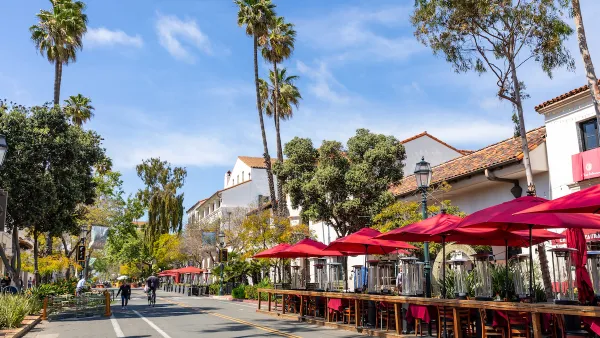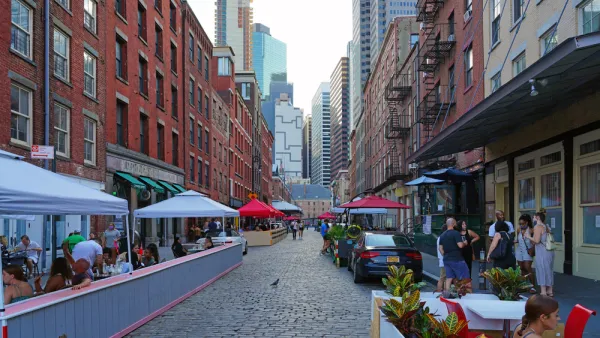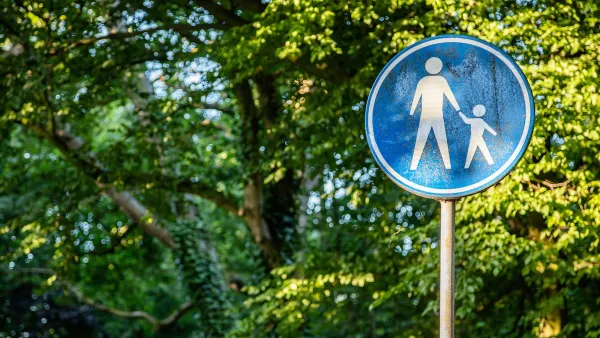Sustainable real estate developer, A-P Hurd asks some fundamental questions about the on-street parking in her Seattle neighborhood and concludes that residents should be able to do more than park cars with the spots in front of their homes.
Hurd writes, "Most of us in single family neighborhoods have a proprietary relationship with the street parking spot in front of their house. We think: "someone is parked in MY spot."
Generally speaking, the street space in front of homes is not owned by the homeowner - but that doesn't deter A-P Hurd, who is also a Runstad Fellow in the College of Built Environments at the University of Washington from exploring possibilities
Living on a narrow street, she asks, "Why is the city in the business of paving and maintaining three lanes of street when only one of them is actually moving cars?" (See her photo of her street in article).
Her next questions stem from the observation that 'curb lanes' are used for nothing but car storage, even when the homes may have driveways and carports or garages.
- "Why should local zoning require on-site parking when hardly any one is using their on-site parking for parking?"
- "The most interesting question: If we think on-site parking has better uses than parking, could we elect to use our street parking for better uses as well?"
- If the resident has "zero, or even one car per household, you're not really allowed to do anything else with that space, so you're losing out relative to your multi-car neighbors." Is that fair?
"Given that people do have this (proprietary) relationship with the parking spot in front of their house, what if we enabled them to do something other than park there? Some compact neighborhoods have taken to putting bike corrals or patios in parking spots..." (photos shown of Mission District parklet, San Francisco and Melrose Market Bike Corral, Seattle).
Hurd doesn't insist on parklets - she suggests 'monetizing' the parking, which is what "The High Price of Free Parking" author, Donald Shoup, defines as a Parking Benefit District. And technology has already jumped on this monetization - there's an 'app' for that.
Bottom line: "There is wasted space in the "parking" lanes of our single family neighborhoods. Let's build some frameworks that open up these spaces to human ingenuity, and see if we can't get more value out of them."
Hurd is also the "author of a recent book of practical strategies to get to better cities and stronger economies using less energy: The Carbon Efficient City."
Thanks to The Atlantic Cities newsletters
FULL STORY: That Parking Spot In Front of Your House Doesn't Belong to You

Analysis: Cybertruck Fatality Rate Far Exceeds That of Ford Pinto
The Tesla Cybertruck was recalled seven times last year.

National Parks Layoffs Will Cause Communities to Lose Billions
Thousands of essential park workers were laid off this week, just before the busy spring break season.

Retro-silient?: America’s First “Eco-burb,” The Woodlands Turns 50
A master-planned community north of Houston offers lessons on green infrastructure and resilient design, but falls short of its founder’s lofty affordability and walkability goals.

Test News Post 1
This is a summary

Analysis: Cybertruck Fatality Rate Far Exceeds That of Ford Pinto
The Tesla Cybertruck was recalled seven times last year.

Test News Headline 46
Test for the image on the front page.
Urban Design for Planners 1: Software Tools
This six-course series explores essential urban design concepts using open source software and equips planners with the tools they need to participate fully in the urban design process.
Planning for Universal Design
Learn the tools for implementing Universal Design in planning regulations.
EMC Planning Group, Inc.
Planetizen
Planetizen
Mpact (formerly Rail~Volution)
Great Falls Development Authority, Inc.
HUDs Office of Policy Development and Research
NYU Wagner Graduate School of Public Service




























